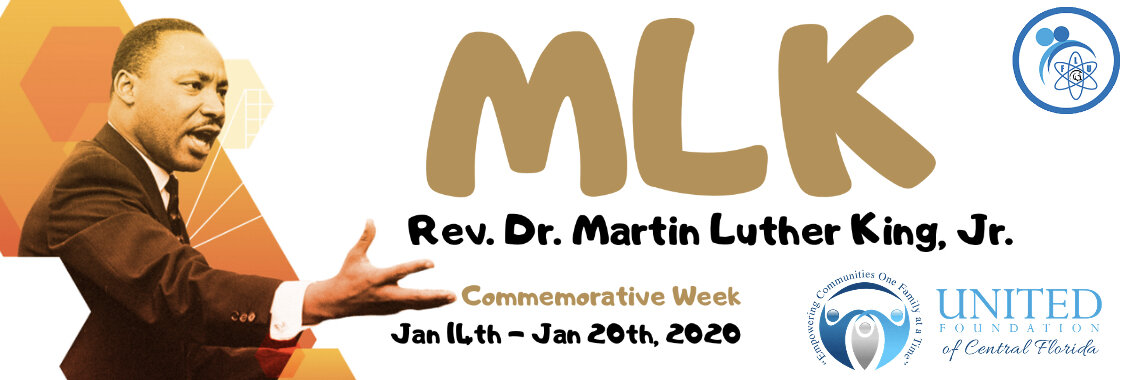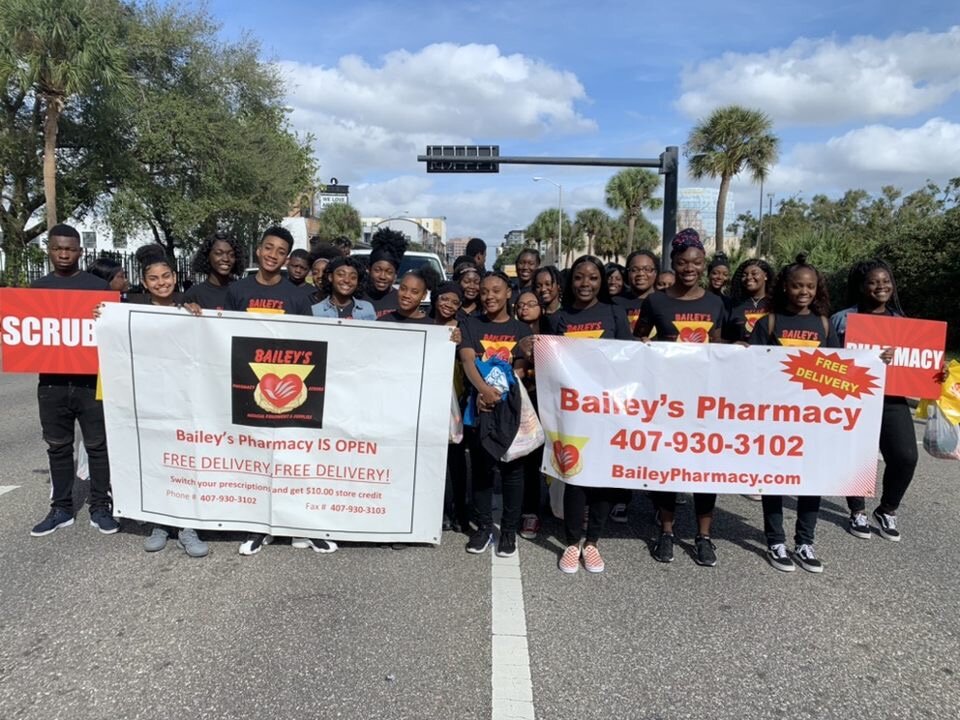MLK Day of Service/ MLK Holiday
Honoring Dr. Martin Luther King, Jr.
Dear UFCF Community,
It warms my heart to be writing to you as we at the foundation honor Dr. Martin Luther King, Jr. Currently enrolled as a junior, political science major with minors in philosophy and religion at Morehouse College, Dr. King's alma mater was a dream of mine and was made possible by the board of directors, partners, sponsors, and other contributors. Because of this investment into my life and dream, I too have continued to pay it forward and have contributed scholarships to the students of our program knowing that Dr. King believed in doing whatever it took to further enhance the quality of life for others.
Today we are honoring the life and legacy of a giant in the Civil Rights Movement who was a 1948 graduate of Morehouse College with a Bachelor of Sociology and later went on to receive a Bachelor of Divinity and a Doctorate in Systematic Theology. Here at the United Foundation of Central Florida, Inc., we have developed our core principles off of the foundation of Dr. King's beliefs.
Our core principles are Equality, Faith, Nonviolence, Education, Love, Leadership, Selflessness, and Hope. We'll share with you below these core principles, however, I also wanted to share with you that the student scholars of the United Foundation of Central Florida, Inc. Future Leaders United After-School Enrichment and Mentoring program participated in the city of Orlando's Mayoral Commission 2020 Dr. Martin Luther King, Jr. parade, as it had a theme "King 2020, The Beloved Community: The Fierce Urgency of Now"; we represented our partner Bailey's Pharmacy and Scrubs.
With that said, take a look at a few photos from the parade and read further about our core principles that we live by as we honor Dr. King, Jr.
In the Spirit of Excellence,
Julien M. Serrano-O'Neil, Community & Volunteer Outreach Coordinator
Our Core Principles
Equality
Quote: "I have a dream that my four little children will one day live in a nation where they will not be judged by the color of their skin, but by the content of their character."
Fact: Martin Luther King Jr. is most remembered for leading the African American Civil Rights Movement in the 1950s and '60s to end segregation (the separation of black people from white people in schools, restaurants, and other public places in the U.S.). He fought for equal rights and fair treatment for people of all races or skin colors.
What our young people can do: Treat all people the way you want to be treated — with kindness and fairness. Think about how we all are different from each other in some ways, but we are the same in so many ways: Inside we all have feelings and deserve to be happy.
Faith
Quote: "Faith is taking the first step even when you don't see the whole staircase."
Fact: Growing up the son of a minister, and later becoming a minister himself, Martin Luther King Jr. was deeply religious. But he also embodied faith in the general, spiritual sense. He believed in making bold goals, even when he wasn't sure where to begin or how things would end.
What our young people can do: Believe in yourself and your goals and dreams. Don't give up or let worry take over when something gets difficult.
Nonviolence
Quote: "Nonviolence is a powerful and just weapon, which cuts without wounding and ennobles the man who wields it. It is a sword that heals."
Fact: In 1959, Martin Luther King Jr. traveled to India and learned a lot about Mahatma Gandhi, a man who led nonviolent protests to help people in India gain freedom from British rule. King believed nonviolence — avoiding the use of weapons and physical fighting — was the best way to work toward equality in the U.S. Because of this, he won the Nobel Peace Prize in 1964.
What our young people can do: Solve conflicts peacefully, without ever hitting or hurting someone. When you feel angry or upset, express your feelings in words and talk about what you need to make things better.
Education
Quote: "The function of education is to teach one to think intensively and to think critically. Intelligence plus character — that is the goal of true education."
Fact: Martin Luther King Jr. was a bright student who skipped two grades and started college at age 15. He went on to earn two bachelors degrees and a PhD. His strong education and love of reading helped him write many powerful sermons and speeches, including his famous "I Have a Dream" speech.
What our young people can do: Work hard in school, and find subjects you are passionate about.Find books that interest you to make reading a part of your life.
Love
Quote: "Darkness cannot drive out darkness; only light can do that. Hate cannot drive out hate; only love can do that."
Fact: Martin Luther King Jr. often spoke about love and brotherhood, encouraging people to think of others — including "enemies" — like family. He believed love, rather than violence and hatred, is the answer to the world's problems.
What our young people can do: When someone treats you poorly, try to treat them well in return. Use your energy to love yourself and help others.
Leadership
Quote: "A genuine leader is not a searcher for consensus but a molder of consensus."
Fact: Simple acts often transform people into important leaders. In 1955, a black woman named Rosa Parks was arrested for refusing to give up her seat to a white man when the "whites only" section of the public bus was full. That sparked Martin Luther King Jr. to lead the Montgomery Bus Boycott — a 13-month protest that helped end segregation on the city's buses and fueled the U.S. Civil Rights Movement.
What our young people can do: Be a leader in a club, on a sports team, or in the classroom. Feel confident in yourself, show good sportsmanship, and help your peers work out conflicts.
Selflessness
Quote: "Life's most persistent and urgent question is, 'What are you doing for others?'"
Fact: Martin Luther King Jr. became a minister because he said he felt an "inner urge" calling him to "serve humanity." He knew that becoming a civil rights leader would be dangerous, but he cared more about helping others than protecting himself.
What our young people can do: Volunteer to help a charity. Invite friends and relatives to come and volunteer with you.
Hope
Quote: "We must accept finite disappointment, but never lose infinite hope."
Fact: Martin Luther King Jr. was jailed a few times for leading nonviolent protests and boycotts, and his home was bombed multiple times, but he kept moving forward. He wasn't sure if he would see the end of segregation in his lifetime, but he still shared his hopes with the world. He was 35 years old when the U.S. passed the Civil Rights Act of 1964, outlawing segregation.
What our young people can do: Think of others throughout history who endured hard times. Even if challenges slow you down, don't give up.






